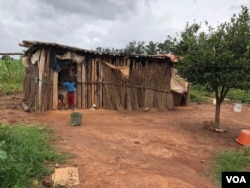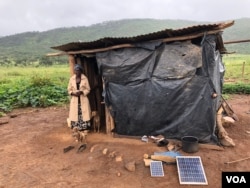A court in Zimbabwe has this week ordered the government and the head of the police force to pay reparations to a group of resettled black farmers whose homes were demolished in 2015 to make way for the former first lady’s game park.
The court victory provides little immediate comfort to the farmers at the Manzou farm in Mazowe district, about 50 kilometers north of Harare.
They have spent the past three rainy seasons without proper shelter.
One of them is King Maposa, who spoke to VOA near what he now calls his bedroom – well, the remains of the original which he has to crawl into to get in.
He says it has been three years of stress. He cannot put on shoes anymore as his feet are always swollen. Doctors said it is due to stress. He is 71 and wonders what he is supposed to do. He was given land for food and a source of livelihood and then it was destroyed. "Then they wanted us leave," he says.
"Where did the president's wife want him to go?", he asked, referring to Grace Mugabe, wife of former president Robert Mugabe. "It has been frightening." He says every time he hears someone coming his heart pounds.
In January and February of 2015 residents say police came with bulldozers and flattened their homes to make way for a new game park being created by Grace Mugabe.
The court in Bindura, some about 100 km north of Harare, ruled Thursday that the evictions were done illegally, and ordered the government and the head of police to pay more than $30,000 in compensation to the 14 farmers. The judge said that police used excessive force and that the residents were not given alternative places to live as required by law.
Challenging impunity
Kumbirai Mafunda, spokesman for the Zimbabwe Lawyers for Human Rights group which represented the first 14 farmers, told VOA an additional 51 cases are still pending from other area residents, also evicted to make way for the game park.
“And we expect the cited authorities to pay the damages as indicated by the court. Zimbabwe Lawyers for Human Rights’ motivation in taking up this case was to do with challenging impunity. So that these actions are not repeated. So that other actors are deterred from doing such injustice,” Mafunda said.
At Manzou farm, the farmers have struggled to make a living as they were barred access to its fields.
Takaitei Chigayo and her husband have been sleeping with their four children in a shelter of mostly plastic sheeting.
She says she hopes the compensation is paid out soon. Their property was destroyed. Their children had no clothes to wear to school, and they could no longer earn enough to pay the school fees. She says they had to spend their days in the hills in hiding.
Grace Mugabe repeatedly stirred up controversy in the final years of her husband’s presidency, something that was ultimately seen as one catalyst that hastened his ouster in November. Robert Mugabe, who turned 94 last month, resigned under pressure from the military after 37 years in power.
Amid the political transition, the farmers at Manzou have managed to plant some crops but they still have not been able to rebuild their homes.
Since Mugabe’s resignation, some of his allies have been arrested for various offenses such abuse of office and corruption.
And scrutiny into the former first lady continues. This coming Monday, Levi Nyagura, the head of the University of Zimbabwe, is expected in court to answer allegations that he improperly awarded a Ph.D. degree to Grace Mugabe.






